/ Oscar Wilde /
.
"Always forgive your enemies; nothing annoys them so much."
.
"Oscar Fingal O'Flahertie Wills Wilde was an Irish poet and playwright. After writing in different forms throughout the 1880s, he became one of the most popular playwrights in London in the early 1890s. He is best remembered for his epigrams and plays, his novel The Picture of Dorian Gray, and the circumstances of his criminal conviction for gross indecency for consensual homosexual acts in "one of the first celebrity trials", imprisonment, and early death from meningitis at age 46. Wilde's parents were Anglo-Irish intellectuals in Dublin. A young Wilde learned to speak fluent French and German. At university, Wilde read Greats; he demonstrated himself to be an exceptional classicist, first at Trinity College Dublin, then at Oxford. He became associated with the emerging philosophy of aestheticism, led by two of his tutors, Walter Pater and John Ruskin. After university, Wilde moved to London into fashionable cultural and social circles."
W
Born: Oscar Fingal O'Flahertie Wills Wilde, October 16, 1854, Dublin, Ireland
Died: November 30, 1900, Paris, France
Occupation: Author, poet, playwright
Language: English, French, Greek
Alma mater: Trinity College Dublin, Magdalen College, Oxford
Period: Victorian era
Genre: Epigram, drama, short story, criticism, journalism
Literary movement: Aesthetic movement, Decadent movement
Notable works: The Canterville Ghost, The Picture of Dorian Gray, The Importance of Being Earnest
.
Oscar Wilde (1947). “The Happy Prince”, p.16, New Line Publishing
.
喜劇大師懷爾德逝世:告別夢幻巧克力工廠
美國演員金·懷德近日離世,享年83歲。他是1971年版《查理和巧克力工廠》裡的威利·旺卡,也曾主演顛覆性的喜劇版《科學怪人》。金·懷德塑造的經典喜劇角色令人難忘。
美國在台協會 AIT
金‧懷德(Gene Wilder),這位因主演電影《歡樂糖果屋》 (與2006年《巧克力冒險工廠》改編自同一部英國兒童文學作品)以及許多梅爾‧布魯克斯(Mel Brooks)喜劇中的角色而成為廣受觀眾喜愛的傳奇演員,週一在家中過世。懷德1933年出生在密爾瓦基的俄羅斯猶太裔移民家庭。他最傳奇的角色莫過於1971年《歡樂糖果屋》裡的威利‧旺卡,這部經典電影數十年來帶給無數美國小孩和家庭美好的回憶。你看過這部電影嗎?
Gene Wilder, the actor beloved for his roles in “Willy Wonka And The Chocolate Factory” and many Mel Brooks comedies, died last night. Gene Wilder was born in Milwaukee in 1933, to an immigrant Russian Jewish family. His most legendary role may have been as candy creator Willy Wonka in the 1971 “Willy Wonka And The Chocolate Factory,” a classic that has been a favorite of American children and their families for decades. Have you seen it? #GeneWilder #willywonka
金‧懷德(Gene Wilder),這位因主演電影《歡樂糖果屋》 (與2006年《巧克力冒險工廠》改編自同一部英國兒童文學作品)以及許多梅爾‧布魯克斯(Mel Brooks)喜劇中的角色而成為廣受觀眾喜愛的傳奇演員,週一在家中過世。懷德1933年出生在密爾瓦基的俄羅斯猶太裔移民家庭。他最傳奇的角色莫過於1971年《歡樂糖果屋》裡的威利‧旺卡,這部經典電影數十年來帶給無數美國小孩和家庭美好的回憶。你看過這部電影嗎?
Gene Wilder, the actor beloved for his roles in “Willy Wonka And The Chocolate Factory” and many Mel Brooks comedies, died last night. Gene Wilder was born in Milwaukee in 1933, to an immigrant Russian Jewish family. His most legendary role may have been as candy creator Willy Wonka in the 1971 “Willy Wonka And The Chocolate Factory,” a classic that has been a favorite of American children and their families for decades. Have you seen it? #GeneWilder #willywonka
Obituary: Gene Wilder
- 29 August 2016
- Entertainment & Arts
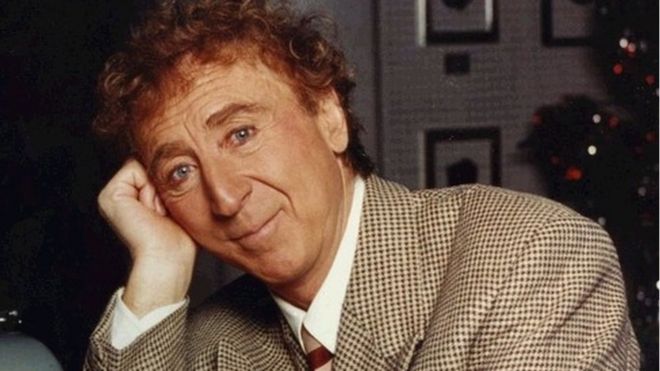
Gene Wilder's distinctive looks helped him create roles that he made his own.
His performances combined sentimentality, comedy and suppressed rage, often veering between idiocy and apoplexy.
Films such as Young Frankenstein, Silver Streak and The Producers established him as one of Hollywood's top comedy talents.
But behind the corkscrew hair, the bulging organ-stop eyes and the twitchy mannerisms, lay a much gentler, more reflective individual.
He was born Jerome Silberman in Milwaukee, Wisconsin, on 11 June 1933.
He later described his childhood as "sane but disturbed" and was always drawn to acting by the "chance to be someone else".
When he was eight years old, Wilder's mother had a heart attack.
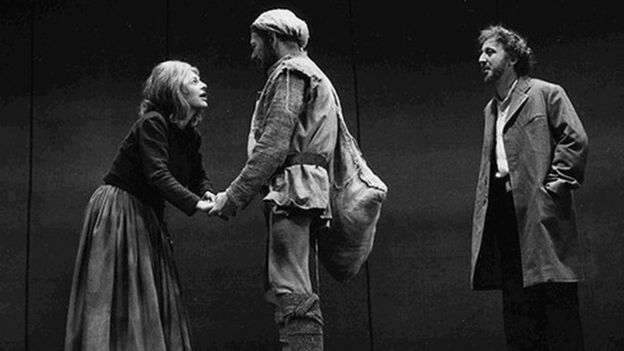 PLAYBILL
PLAYBILL
Her doctor took the confused child to one side and told him: "Don't ever get angry with her, you might kill her." He turned to leave and added: "You can make her laugh, though."
For years Wilder harboured the belief that any harsh words would end his mother's life.
His parents sent him to a military school in Hollywood where, as the only Jewish boy, he recalled the bullying that made his life a misery.
He quickly returned home where he became involved with the local theatre, making his first public performance at the age of 15 in a production of Romeo and Juliet.
Critic
He took a course in Communication and Theatre Arts at the University of Iowa before moving to England to pursue his studies with the Bristol Old Vic Theatre School.
He felt stifled by his acting lessons in Britain, but became the first American to win the English Schools Fencing Championship. He admitted he had always worshipped Errol Flynn.
In 1956 he was drafted into the US Army where he found himself posted as an aide in a psychiatric ward, helping to administer electro-shock therapy to patients.
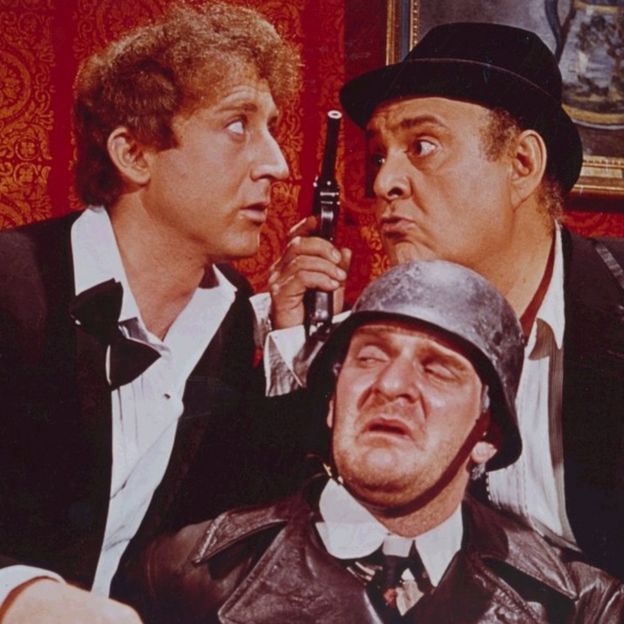 REX FEATURES
REX FEATURES
On his discharge, he went back to acting, having changed his name to Gene Wilder, partly, he later said, because he could not imagine a Jerry Silberman being asked to play Hamlet.
He also became an outspoken critic of the US involvement in Vietnam and would later oppose the invasion of Iraq.
In 1961, he had a small part in a production of Arnold Wesker's Roots and made his Broadway debut as the comic valet in The Complaisant Lover.
His breakthrough came in 1963, when he starred alongside Anne Bancroft in a Broadway production of Bertolt Brecht's play, Mother Courage and Her Children.
Spontaneity
Bancroft was then dating her future husband, Mel Brooks, who invited Wilder to look at a screenplay provisionally entitled Springtime for Hitler.
At the time, Brooks lacked the money to turn it into a film so, in the event, Wilder's first cinema role was that of Eugene Grizzard, the undertaker captured by Bonnie and Clyde in the 1967 gangster film.
A year later Brooks finally began casting The Producers. Wilder's role as the neurotic accountant brought him his first Oscar nomination in 1968, for Best Supporting Actor.
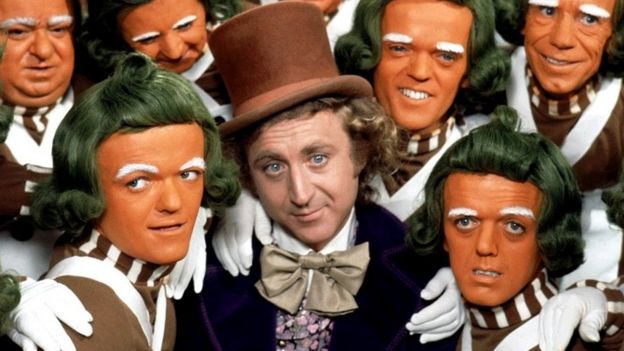 REX FEATURES
REX FEATURES
Wilder was liberated by the spontaneity of Brooks's direction and the pair enjoyed an extremely successful partnership.
In 1971, he gave a tour de force performance as Willy Wonka in the film adaptation of Roald Dahl's children's novel.
Wilder stipulated that he would not take the role unless Wonka's opening scene saw him pretending to be crippled and leaning on a cane.
It became one of the film's most memorable moments as Wilder halts, tumbles forward then leaps back on to his feet.
Screenwriting
"I knew that from then on," Wilder says, "the audience wouldn't know if I was lying or telling the truth."
In Woody Allen's 1972 comedy Everything You Wanted to Know About Sex (But Were Afraid to Ask), Wilder played a doctor who was in love with a sheep.
Wilder was reunited with Brooks for the 1974 spoof Western Blazing Saddles, and the inspired lunacy of his trigger-happy Waco Kid, burnt out at 29, helped create a worldwide hit.
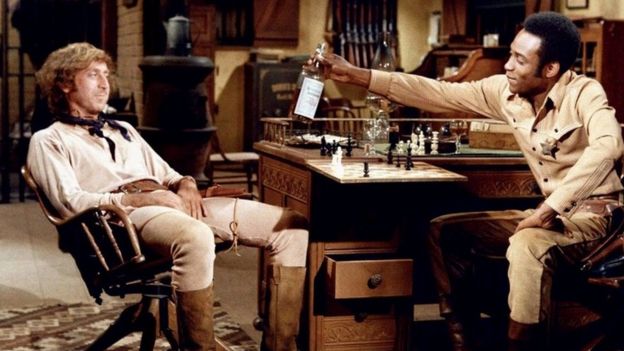 REX FEATURES
REX FEATURES
In the same year Young Frankenstein brought him and Brooks another Oscar nomination, this time for screenwriting.
He spoke of an almost "telepathic rapport" with Richard Pryor, and the comic duo blundered their way through a series of films, including Silver Streak in 1976 and Stir Crazy in 1980.
"I have an affinity with people who've had a tough time in their lives," he later said
When Pryor's ill health prevented his appearing again with Wilder in Hanky Panky in 1982, the part was rewritten for the doyenne of the Saturday Night Live line-up, Gilda Radner.
Disenchanted
She became Wilder's third wife and occasional co-star, but died of ovarian cancer in May 1989.
Radner had been misdiagnosed in the 10 months before her death and, for the next five years, Wilder channelled his energy into saving "the hundreds of other Gildas out there".
In 1990, he established a Los Angeles cancer detection centre in her name, and even went to Congress to speak out for early medical screening for women at risk. Gilda's Clubs sprang up all over America.
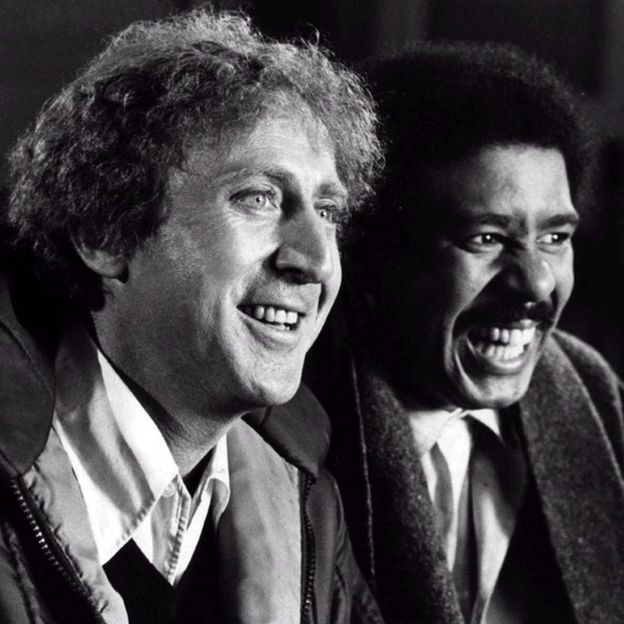 GETTY IMAGES
GETTY IMAGES
Wilder married again in 1991, and later returned to performing.
For two years, he starred in the NBC sitcom Something Wilder and, in 1996, made his London stage debut in Neil Simon's Laughter on the 23rd Floor.
He continued to act, notably appearing as the Mock Turtle in a star-studded US TV version of Alice in Wonderland, but he was becoming increasingly disenchanted with the limelight.
"I don't like show business, I realised," he explained on a Turner Television tribute. "I like show, but I don't like the business."
He was scathing about 2005's Charlie and the Chocolate Factory, the Warner Bros remake of Willy Wonka, describing it as a money-making exercise.
The same year he published a very personal account of his life, Kiss Me Like a Stranger: My Search for Love and Art.
Over the following seven years he published three novels, My French Whore, The Woman Who Wouldn't and, in 2013, Something to Remember You By: A Perilous Romance.
For all the vicissitudes he suffered in his personal life, the boy who kept his mother alive with his funny voices succeeded in conveying his own quirky brand of humour to millions of others.

沒有留言:
張貼留言